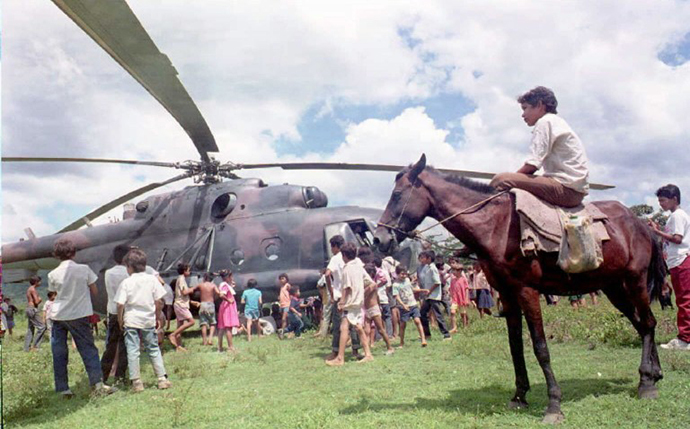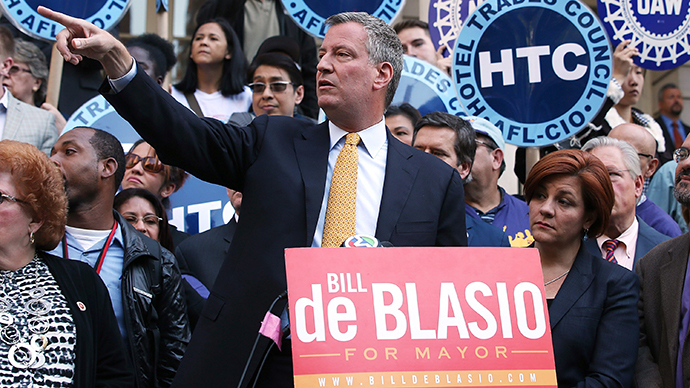Just call him Citizen de Blasio. An extensive profile by the New York Times this week of New York City mayoral candidate Bill de Blasio has, of all things, inserted Nicaraguan politics into what was already a colorful enough contest.
Spread out over the newspaper’s Monday report was a profile of a young, wide-eyed and unshaven De Blasio who became involved with the Quixote Center, a Maryland-based social justice group created by a Catholic priest in the early 1970s, which actively assisted the governing Sandinista government in Nicaragua to great controversy at the time.
Despite the intervening decades since his work delivering medical supplies to Nicaragua with the Quixote Center in the late 1980s, the article predictably provided fodder to the ongoing mayoral race, where de Blasio continues to be the frontrunner, and allowed his opponents to wonder out loud whether the candidate continues to be a crypto pupil of Nicaragua’s long-standing Sandinista National Liberation Front.
Though the involvement of the US in reducing Nicaragua into a
proxy war against Soviet influence has itself largely been
reduced to political tropes into the present day, the involvement
of de Blasio with the group’s activities in the Central American
country and with other socialist-identified groups in the early
1990s has now left him vulnerable to easy jabs.

Since the profile ran, De Blasio has already fallen victim to attacks by his Republican and Independence Party opponents, who will now henceforth and with glee insert Marxist connotations at every opportunity to sharpen De Blasio’s past into an uncomfortable wildcard.
Supporting “the Sandinistas, who were fighting Americans as well as capitalism, was absolutely not the right thing to do during the Cold War,” Republican candidate Joe Lhota said Monday.
In a release via his campaign on the same day, Adolfo Carrion Jr., the Independence Party candidate, used the Times article to brand De Blasio a “radical without a clue,” and blasted the Democratic candidate for “propping up a brutal dictatorship in Central America” despite “confusing” US policy at the time.
Meanwhile, reporters seemingly fell over one another for a shot at records of the Nicaragua Solidarity Network of Greater New York, which were held by New York University and had lain dormant for two decades until interest in their activities suddenly peaked this week.
But aren’t the attacks fair game, after all? The campaign made little mention of De Blasio’s background, which the Times characterized as being “far more political” than was indicated. On Tuesday, the candidate quite literally ran from questions over the recent article and led reporters on a short chase through the grounds of a Manhattan apartment complex. Not exactly a stand-and-deliver moment.
On Wednesday, De Blasio finally confronted the attacks after a question by a reporter with Univision.
"A lot of us in this country believe that the United States policies towards Central America in the 1980s were wrong," said De Blasio.
De Blasio, who became a volunteer with the Nicaragua Solidarity Network following his work with the Quixote Center, no doubt appears to have been an admirer of grassroots socialist activism of the sort he identified with the Sandinistas. In 1990 De Blasio went so far as to tell the Times that the Sandinistas had “built a democracy that was striving to be economic and political, that pervaded all levels in society.”
That hasn’t stopped political observers on the pages of the New York Post, who while largely skirting the more “confusing” aspects of American funding of the brutal Contras and a whole host of other annoying historical complexities, question De Blasio’s judgment based on his prior association with the pro-Sandinista movement.
In their opening salvos this week, commentators draw parallels among the candidate’s mantra to “fight inequality” with the candidate’s alleged deep interest in transforming New York City into some dystopian mirror of Havana.
“Consider that De Blasio and his wife snuck into Cuba for their honeymoon in 1994,” writes columnist Michael Goodwin for the Post.
"De Blasio, the political operative and union organizer, whose world view is rooted in the Castro/Guevara philosophy that fueled the Sandinista dictatorship, is surrendering his policy agenda to collective bargaining organizations," Carrio said.
The now dated comments and the recently unearthed flyers and campaign materials produced by the Nicaragua Solidarity Network are not, as unhinged as they might now seem, likely to scare most liberal New York voters. In this case, De Blasio benefits from running in a city where the majority of his liberal base will be largely unfazed, and possibly even sympathetic to his early experimentation (he did not “inhale” apparently) with more extreme forms of progressive politics.
For De Blasio’s campaign, the aim is now to hammer away at the
coiffed image of the even-keeled progressive versus the
long-forgotten, unkempt activist that went off in search of
egalitarianism in Managua. In politics, and particularly during
electoral campaigns, it is the creeping insinuations that are
worked over until they finally leave an ugly film over a
candidate’s image.
Leandro Oliva, RT
The statements, views and opinions expressed in this column are solely those of the author and do not necessarily represent those of RT.
The statements, views and opinions expressed in this column are solely those of the author and do not necessarily represent those of RT.

